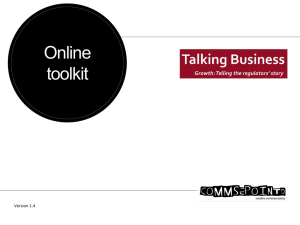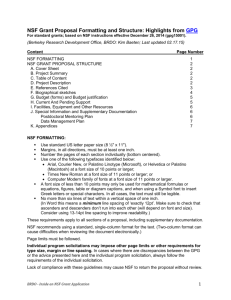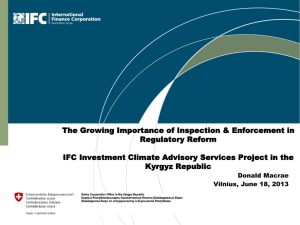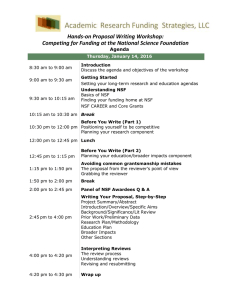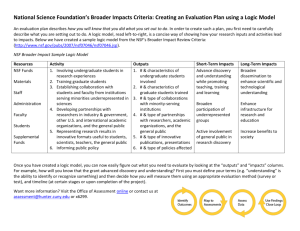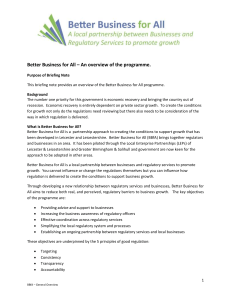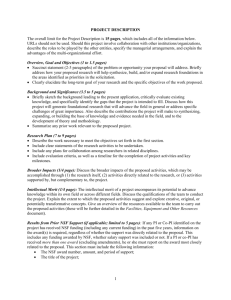The NSF CAREER Award
advertisement
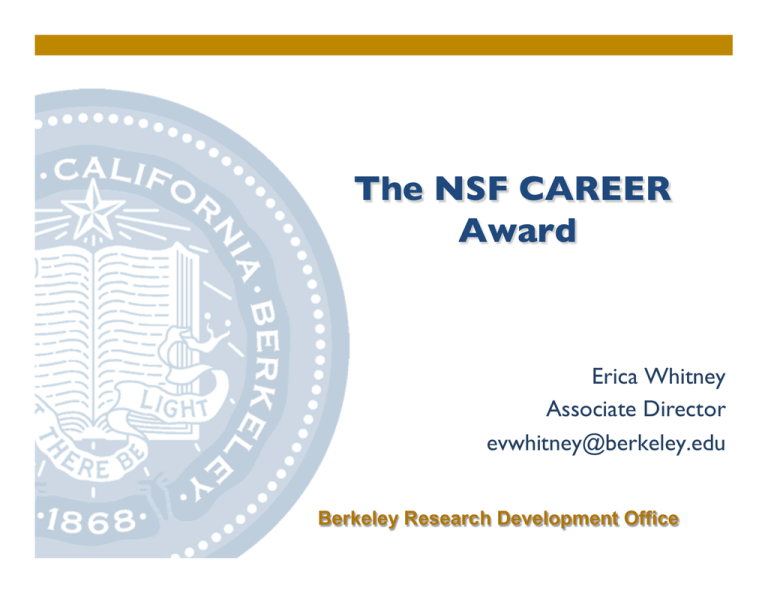
The NSF CAREER Award Erica Whitney Associate Director evwhitney@berkeley.edu Berkeley Research Development Office NSF CAREER website http://www.nsf.gov/career – RFA (http://www.nsf.gov/pubs/2015/nsf15555/nsf15555.htm) – FAQs (http://www.nsf.gov/pubs/2015/nsf15057/nsf15057.jsp) – NSF contacts – Funded awards – Career-Life Balance supplements – Supplemental research opportunities BRDO Purpose § To support junior faculty who exemplify the role of teacher-scholars through outstanding research, excellent education and the integration of education and research. § To build a firm foundation for a lifetime of leadership in integrating education and research, where research is enhanced by inspired teaching and enthusiastic learning. BRDO Purpose § A career development award, not just a research award. BRDO Eligibility § Hold a doctoral degree by the deadline date in a field supported by NSF; be untenured until October 1 following the deadline; and have not previously received a CAREER award – AND § Be employed in a tenure-track (or tenure-trackequivalent) position as an assistant professor (or equivalent title by October 1 following the submission deadline. BRDO Number of submissions § You can enter 3 CAREER competitions. § You cannot submit the same research proposal to more than one entity. § The proposed research must be distinct from any other federally-funded research. BRDO Deadlines § Directorate-dependant: – BIO, CISE, EHR: July 20, 2016 – ENG: July 21, 2016 – GEO, MPS, SBE: July 22, 2016 BRDO Choosing a Program to Submit To § Indicate the program you wish to review/fund your proposal on your proposal’s cover page. § Multidisciplinary proposals can list multiple divisions on the cover page. BRDO NSF Organization Director • Office of Integrative Activities • Office of Int. Science & Engineering National Science Board Biological Sciences Computer & Information Science Engineering Social, Behavioral & Econ Sciences BRDO Math & Physical Sciences Engineering Geosciences Education & Human Resources NSF Organization OFFICE OF DIVERSITY & INCLUSION (ODI) NATIONAL SCIENCE FOUNDATION NATIONAL SCIENCE BOARD (NSB) Rhonda Davis, Head 703.292.8020 OFFICE OF THE GENERAL COUNSEL (OGC) OFFICE OF THE DIRECTOR 703.292.8000 Dan E. Arvizu Chair Kelvin K. Droegemeier Vice Chair Lawrence Rudolph, General Counsel Peggy Hoyle, Deputy GC 703.292.8060 A. Córdova France A.France Córdova 703.292.7000 Director Director Vacant Vacant OFFICE OF INTEGRATIVE ACTIVITIES (OIA) Suzanne Iacono, Head 703.292.8040 Richard Buckius Chief Operating Officer NATIONAL SCIENCE BOARD OFFICE OFFICE OF INTERNATIONAL SCIENCE & ENGINEERING (OISE) Michael Van Woert Executive Officer 703.292.7000 Rebecca Keiser, Head 703.292.8710 Deputy Director Deputy Director OFFICE OF INSPECTOR GENERAL (OIG) OFFICE OF LEGISLATIVE & PUBLIC AFFAIRS (OLPA) Allison C. Lerner, Inspector General Amanda Greenwell, Head 703.292.8070 703.292.7100 DIRECTORATE FOR BIOLOGICAL SCIENCES (BIO) James L. Olds, Assistant Director Jane Silverthorne, Deputy AD 703.292.8400 DIRECTORATE FOR COMPUTER & INFORMATION SCIENCE & ENGINEERING (CISE) DIRECTORATE FOR EDUCATION & HUMAN RESOURCES (EHR) James F. Kurose, Assistant Director Joan Ferrini-Mundy, Assistant Director Erwin Gianchandani, Acting Deputy AD William (Jim) Lewis, Deputy AD 703.292.8900 703.292.8600 DIVISION OF BIOLOGICAL INFRASTRUCTURE (DBI) Muriel E. Poston, Division Director 703.292.8470 DIVISION OF COMPUTER & NETWORK SYSTEMS (CNS) Peter Arzberger, Acting Division Director 703.292.8950 DIVISION OF GRADUATE EDUCATION (DGE) Dean Evasius, Division Director 703.292.8630 DIVISION OF ENVIRONMENTAL BIOLOGY (DEB) Paula M. Mabee, Division Director 703.292.8480 DIVISION OF COMPUTING & COMMUNICATION FOUNDATIONS (CCF) Rao Kosaraju, Division Director 703.292.8910 DIVISION OF HUMAN RESOURCE DEVELOPMENT (HRD) Sylvia James, Division Director 703.292.8640 DIVISION OF INTEGRATIVE ORGANISMAL SYSTEMS (IOS) Heinz G. de Couet, Division Director 703.292.8420 DIVISION OF MOLECULAR & CELLULAR BIOSCIENCES (MCB) Linda E. Hyman, Division Director 703.292.8440 DIVISION OF ADVANCED CYBERINFRASTRUCTURE (ACI) Irene Qualters, Division Director 703.292.8970 DIVISION OF INFORMATION & INTELLIGENT SYSTEMS (IIS) Lynne E. Parker, Division Director 703.292.8930 DIVISION OF RESEARCH ON LEARNING IN FORMAL & INFORMAL SETTINGS (DRL) Evan Heit, Division Director 703.292.8620 DIVISION OF UNDERGRADUATE EDUCATION (DUE) Susan Singer, Division Director 703.292.8670 OFFICE OF EMERGING FRONTIERS (EF) Charles Liarakos, Program Director 703.292.8508 National Science Foundation 4201 Wilson Boulevard Arlington, Virginia 22230 TEL: 703.292.5111 | FIRS: 800.877.8339 | TDD: 800.281.8749 BRDO DIRECTORATE FOR ENGINEERING (ENG) Pramod P. Khargonekar, Assistant Director Grace Wang, Deputy AD 703.292.8300 DIVISION OF CHEMICAL, BIOENGINEERING, ENVIRONMENTAL & TRANSPORT SYSTEMS (CBET) JoAnn Lighty, Division Director 703.292.8320 DIVISION OF CIVIL, MECHANICAL & MANUFACTURING INNOVATION (CMMI) Deborah Goodings, Division Director 703.292.8360 DIVISION OF ELECTRICAL, COMMUNICATIONS & CYBER SYSTEMS (ECCS) Samir El-Ghazaly, Division Director 703.292.8339 DIVISION OF ENGINEERING EDUCATION & CENTERS (EEC) Mario Rotea, Division Director 703.292.8380 DIVISION OF INDUSTRIAL INNOVATION & PARTNERSHIPS (IIP) Barry Johnson, Division Director 703.292.8050 OFFICE OF EMERGING FRONTIERS IN RESEARCH & INNOVATION (EFRI) Sohi Rastegar, Senior Advisor 703.292.8301 DIRECTORATE FOR GEOSCIENCES (GEO) DIRECTORATE FOR MATHEMATICAL & PHYSICAL SCIENCES (MPS) DIRECTORATE FOR SOCIAL, BEHAVIORAL, & ECONOMIC SCIENCES (SBE) Roger Wakimoto, Assistant Director Fleming Crim, Assistant Director Fay L. Cook, Assistant Director Margaret Cavanaugh, Deputy AD Clifford Gabriel, Acting Deputy AD Kellina M. CraigHenderson Deputy AD 703.292.8500 703.292.8800 703.292.8700 OFFICE OF BUDGET, FINANCE, & AWARD MANAGEMENT (BFA) Martha A. Rubenstein, Head / Chief Financial Officer Teresa Grancorvitz, Deputy Head 703.292.8200 OFFICE OF INFORMATION & RESOURCE MANAGEMENT (OIRM) Joanne S. Tornow, Head / Chief Human Capital Officer Donna Butler, Deputy Office Head 703.292.8100 DIVISION OF ATMOSPHERIC & GEOSPACE SCIENCES (AGS) Paul Shepson Division Director 703.292.8520 DIVISION OF ASTRONOMICAL SCIENCES (AST) James Ulvestad, Division Director 703.292.8820 DIVISION OF BEHAVIORAL & COGNITIVE SCIENCES (BCS) Howard Nusbaum, Division Director 703.292.8740 BUDGET DIVISION (BUD) Michael Sieverts, Division Director 703.292.8260 DIVISION OF ADMINISTRATIVE SERVICES (DAS) Wonzie Gardner, Acting Division Director 703.292.8190 DIVISION OF EARTH SCIENCES (EAR) Carol Frost, Division Director 703.292.8550 DIVISION OF CHEMISTRY (CHE) Carol Bessel, Acting Division Director 703.292.8840 DIVISION OF SOCIAL & ECONOMIC SCIENCES (SES) Alan Tomkins, Acting Division Director 703.292.8760 DIVISION OF ACQUISITION AND COOPERATIVE SUPPORT (DACS) Jeffery Lupis, Division Director 703.292.8240 DIVISION OF INFORMATION SYSTEMS (DIS) Dorothy Aronson, Division Director 703.292.8150 DIVISION OF OCEAN SCIENCES (OCE) Richard Murray, Division Director 703.292.8580 DIVISION OF MATERIALS RESEARCH (DMR) Linda S. Sapochak, Acting Division Director 703.292.8810 NATIONAL CENTER FOR SCIENCE AND ENGINEERING STATISTICS (NCSES) John Gawalt, Division Director 703.292.8780 DIVISION OF FINANCIAL MANAGEMENT (DFM) Michael Wetklow, Division Director 703.292.8280 DIVISION OF HUMAN RESOURCE MANAGEMENT (HRM) Judy Sunley, Division Director 703.292.8180 DIVISION OF POLAR PROGRAMS (PLR) Kelly Falkner, Division Director 703.292.8030 DIVISION OF MATHEMATICAL SCIENCES (DMS) Michael Vogelius, Division Director 703.292.8870 DIVISION OF GRANTS & AGREEMENTS (DGA) Karen M. Tiplady, Division Director 703.292.8210 DIVISION OF PHYSICS (PHY) Denise Caldwell, Division Director 703.292.8890 DIVISION OF INSTITUTION & AWARD SUPPORT (DIAS) Dale Bell, Division Director 703.292.8230 OFFICE OF MULTIDISCIPLINARY ACTIVITIES (OMA) Clark Cooper, Office Head 703.292.8800 LARGE FACILITIES OFFICE Matthew J. Hawkins, Deputy Director 703.292.4416 February 2016 Directorate of Biological Sciences (BIO) Divisions of: § Biological Infrastructure (DBI) § Environmental Biology (DEB) § Integrative Organismal Systems (IOS) § Molecular and Cellular Biosciences (MCB) § Emerging Frontiers (EF) BRDO Clusters § MCB – Cellular Dynamics and Function – Genetic Mechanisms – Molecular Biophysics – Systems and Synthetic Biology BRDO See What’s Been Funded: Advanced Search BRDO Funding § Directorate-dependant: – BIO, ENG, and PLR: minimum $500,000 total for 5 years – Others: minimum $400,000 total for 5 years • Total costs = direct + indirect costs § Look at what’s been funded to see what the normal level is for your area. § Talk to your program officer to see what levels they are funding at. BRDO Funding § Can fund: – Yourself – Postdocs – Grad students – Travel – Supplies, etc. § Can’t fund: – Senior personnel (other faculty or senior staff) BRDO Supplemental Funding § Career-Life Balance (if on family leave for childbirth/adoption or elder care) § Research Opportunities in Europe (collaboration with ERC-funded researchers) § Research Opportunities in Germany (collaboration with DFG-funded researchers) BRDO BRDO BRDO Writing the Proposal § Follow the instructions in the RFA § Follow the instructions in the NSF Grant Proposal Guide (GPG) http://www.nsf.gov/pubs/policydocs/pappguide/nsf16001/gpg_index.jsp BRDO Proposal Components BRDO § § § § § § § § § § § Project summary (1 page) Project description (15 pages) Biosketch (2 pages, using NSF format) Departmental letter (2 pages) Letters of collaboration (if applicable, 1 page each) Postdoc mentoring plan (if applicable, 1 page) Data management plan (2 pages) Facilities & Resources References Cited Budget Budget justification (3 pages) Preparing to Write 1. Identify a strategic plan. 2. Define your research question. 3. Define your needs. 4. Draft the proposal. BRDO 1. Identify a Strategic Plan § What are your strategic, long-term career goals? § What steps do you need to take to get there? § How would this award help you achieve those goals? BRDO 2. Define Your Research Question § Identify a gap in knowledge in your field. § Identify a problem whose solution will be a big step forward for the field, rather than an incremental step. § Choose a problem that is going to matter to more people than just you. BRDO 2. Define Your Research Question § Place your research question in the context of your larger research plan for your career. § Which portion of your long-term career goals will be addressed with this grant? BRDO 3. Define Your Need § What do I need in order to do my research that I don’t already have? § How much do I need? § Who do I need to help me? BRDO 4. Draft the Proposal Understand your audience: § Assume you are not writing for an expert. § Target your proposal at 3 levels: – Someone who doesn’t know your field. – Someone familiar with, yet not expert in your field. – Someone expert in your field. BRDO 4. Draft the Proposal More detailed instructions available in the “NSF CAREER Award Writing Guide.” BRDO Project Summary Three Sections: § Overview section: – Research and education objectives. – Plans for the integration of education and research activities. § Separate sections on how the proposal meets both the Intellectual Merit and Broader Impact review criteria. § 4700 characters, in three separate boxes (can upload PDF if using special characters). BRDO Project Description, per NSF: § The proposed research project, including preliminary supporting data where appropriate, specific objectives, methods and procedures to be used, and expected significance of the results; § The proposed educational activities, including plans to evaluate their impact on students and other participants; § How the research and educational activities are integrated with one another; and § Results of prior NSF support, if PI or co-PI on any grant in last 5 years. BRDO Project Description § Proposers should address: – what they want to do, – why they want to do it, – how they plan to do it, – how they will know if they succeed, and – what benefits could accrue if the project is successful. BRDO Project Description § Include: – Objectives/Specific aims – Research Plan – Education Plan – Broader Impacts – Timeline/Milestones – Results from Prior NSF Support (or say “Not applicable”) BRDO Project Description § For the Research Plan, include: – Background and Significance – Preliminary Data – Research Design and Methods – Potential Pitfalls and Alternative Approaches – Evaluation/Expected Outcomes – Timeline – Future steps BRDO Project Description § Presentation is important! – Proper English – Correct grammar – Attractive formatting – Effective figures and tables (don’t forget the titles and captions) BRDO NSF Peer Review Criteria What is the intellectual merit of the proposed activity? BRDO What are the broader impacts of the proposed activity? Peer Review Criteria Intellectual Merit: The potential to advance knowledge Broader Impacts: The potential to benefit society and contribute to the achievement of specific, desired societal outcomes BRDO NSF Peer Review Criteria 1. What is the potential for the proposed activity to: a. Advance knowledge and understanding within its own field or across different fields (Intellectual Merit); and b. Benefit society or advance desired societal outcomes (Broader Impacts)? 2. To what extent do the proposed activities suggest and explore creative, original, or potentially transformative concepts? BRDO NSF Peer Review Criteria 3. Is the plan for carrying out the proposed activities well-reasoned, well-organized, and based on a sound rationale? Does the plan incorporate a mechanism to assess success? 4. How well qualified is the individual, team, or organization to conduct the proposed activities? 5. Are there adequate resources available to the PI (either at the home organization or through collaborations) to carry out the proposed activities? BRDO Peer Review Scoring Excellent BRDO Very Good Good Fair Poor NSF Staff Review Criteria § Integration of research and education. § Integrating diversity into NSF programs, projects, and activities. BRDO The NSF CAREER Award: Creating a winning education plan Kate Spohr Research Outreach Specialist kspohr@berkeley.edu Berkeley Research Development Office CAREER program Goal of Faculty Early Career Development Program— To support junior faculty who exemplify the role of teacherscholars through outstanding research, excellent education and the integration of education and research. 15 page project description BRDO • Objectives/specific aims • Research plan • Education plan • Broader impacts • Results from prior NSF support Developing your education plan BRDO Identify the “right” focus & scope § What types of E&O activities does your research lend itself to? § What unique expertise, resources, and assets can you provide? § Where can you have the biggest impact? § What do you want to spend 5 years on? (AND: What are you realistically able to accomplish in 5 years?) § How will the education plan be integrated with your research plan? BRDO Involving the community, leveraging partnerships § What gaps can you address? § How can you involve others in your research—particularly those underrepresented in STEM? § How can you involve your whole lab? § What partners can you engage with? BRDO Partnerships are key Per NSF: Proposers are encouraged to collaborate with, utilize resources in academia and from other sectors (i.e. industry, museums, schools, after school programs, community orgs, etc). Benefits of partnering § Lends credibility to your project. § Adds expertise to your team. § Provides in-kind resources—e.g. marketing lists, facilities, volunteers. § Helps with scaling up, dissemination. § Builds in sustainability. BRDO Elements of a successful education plan § Activities go beyond your ordinary job duties. BUT: the workload is not be unreasonable. § Activities are informed by research & best practices in education/pedagogy (use references). § Traditionally underrepresented communities are included in meaningful ways. § Activities include measurable outcomes. § Activities match the expectations of the NSF directorate to which you are applying (search abstracts, check with program officer). BRDO Education plan (suggested length 3-5 pgs) § Overview, background, aims § Design and methods § Evaluation § Integration of research and education § Broader impacts § Timeline BRDO Remember the review criteria! Potential to advance knowledge and benefit society Adequate resources Wellqualified proposer Intellectual Merit & Broader Impacts Original, potentially transformative Sound rationale & mechanism to assess success All 5 review elements apply to Intellectual Merit and Broader Impacts. BRDO Frequently asked questions § How much weight does NSF give to each criteria in the review process? § What number and scope of education activities is reasonable? § How important are the concepts of creativity and originality in education plans? § What level of effort & financial commitment is expected? BRDO Beyond the award – supplements § REU – Research Experiences for Undergraduates, $6k/student/year. Up to 2 students; more if URM. § RET – Research Experiences for Teachers, up to $10k/teacher/year (stipend/supplies). 1-2 teachers per year, ENG and CISE only. – Contact your program director first. – Apply at beginning of fiscal year (October). – All progress reports must be up to date! BRDO Broader impacts help, consultations Kate Spohr, kspohr@berkeley.edu brdo.berkeley.edu BRDO
